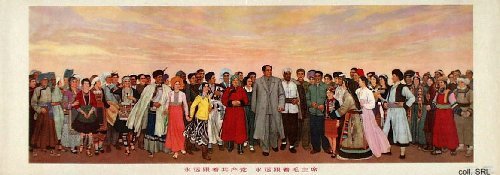





The nationalities' policies as phrased in the Common Program of 1949, the provisional Constitution that predated the first Constitution promulgated in 1954, actually favored those groups that had a minority status। One result of this was that the first national census, which took place in 1953, reported no less than 400 minorities. In the period 1953-1956, all these groups that asserted a separate nationality status were determined by applying the definitions that Josef Stalin had defined as markers for nationality status. Thus, they had to share a common language, a common economic base, a common psychological makeup (or culture), and a common territory. As this was not always applicable in China, the markers of historical origin, migration history and agreement by the people themselves were added. By applying these definitions, 54 minorities had been officially recognized as such by 1957. Over the years, the identification work would continue. The last people to be recognized, the Jinou, was added in 1979.
It is important for an ethnic group to be officially recognized as a national minority. Minority peoples are given special treatment, including a license of moral, cultural, religious and social liberties which the state does not wish to grant to the majority of the population. These liberties include a family planning policy which does not restrict the number of children; the right to retain certain marriage patterns and traditions of conducting one's sexual life; and the right to engage in various forms of religious practices which are otherwise considered "superstitious"। On the political level, being a minority may lead to a level of limited autonomy that leaves room for local decisions on education, finances, culture and religion. It is also important for the state to officially recognize a national minority. It has set up an apparatus for registering and administrating ethnic differences, allotting different rights to different ethnic groups. This enables selective social control and formal structures for political inclusion or cooptation of groups which otherwise might alienate themselves from the system.
The cooptation of minority interests has been an important factor in forging national unity, in merging all 56 national individual minorities into one Chinese nation। Another element has been the presentation of the best and most pliable elements of nationality culture in terms of this unity. In the media, national dances, music and songs are woven together in a mixture which implies unity while at the same time emphasizing the individual characteristics of each nationality.
Although it can be said that these elements have saved certain minority practices from extinction, they at the same time have had a stiffling effect on the development of these peoples. The 'noble savages' in their colorful national costumes, fellow countrymen yet so alien, living in their traditional dwellings and compounds, engaging in traditional songs and dances, have become important components of a thriving tourist industry that caters to both foreign and Chinese visitors. Sadly enough, the minorities themselves usually are not sharing in the profits.

No comments:
Post a Comment